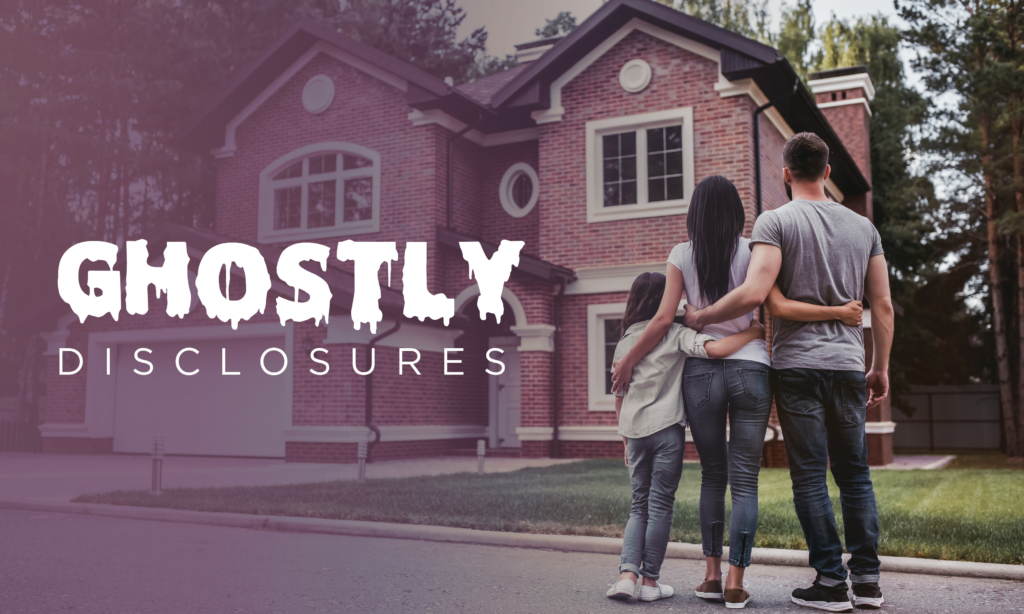Most real estate professionals know the ins and outs of disclosing physical damage or immediate hazards about a home to potential buyers. Whether its faulty wiring in the basement, or mold damage due to moisture, there’s a disclosure form for that. But what about issues with the property that aren’t so apparent – more psychological, stigmatized… or even haunted?
A stigmatized property is any building that has a detrimental issue that is not related to the physical condition of the house. This could include a sordid history – say, a murder or suicide on the premises – or even a belief that the house has a supernatural visitor. According to the Texas Property Code, murder is the only event that needs to be disclosed. “Sellers and their agents aren’t required to disclose deaths on properties that resulted from natural causes, suicide, or an accident unrelated to a property’s condition,” said Lori Levy, vice president of Legal Affairs and general counsel for Texas Realtors. “However, murder does not fall into these categories [and] is required to be disclosed.”
Brokers in Texas should count their blessings, as several other states throughout the country are much more specific about their disclosure laws. In California, anything that could affect the material value of a home is required to be disclosed. That includes death and property that is stigmatized, such as a property that is known to have a haunting past. “Anything that affects, or could potentially affect, the material value of the property needs to be disclosed,” said Cindi Hagley, owner of the Hagley Group in Pleasanton, California. “If there’s been a death on the property in the last three years, that must be disclosed. Manner of death doesn’t need to be disclosed, but if were asked about it as licensed [real estate professionals], we want to disclose that if they ask about it…”
Hagley, who’s known throughout California as the stigmatized home specialist, noted that it’s not just about ghostly visitors. “Stigmatized homes could be a meth lab,” she said, noting that haunted houses are relatively rare. As a consultant for many agencies around the country, she always recommends that agents disclose as much as possible, even if the state doesn’t require it. “If there was a mass murder on a piece of property and a buyer who was looking from out of state doesn’t know this, I think the buyer should know that that happened,” she said, noting that the buyer could have a case for a lawsuit.
Levy doesn’t see the Texas disclosure law changing anytime soon. As long as agents are fulfilling their responsibilities to their clients, she doesn’t think there will be a push to upgrade the law. In fact,Texas is already ahead of the game, as many states don’t even require real estate professonials to disclose if murder occurred on the premises. “Every buyer needs to do their own due diligence,” said Levy. “If there’s something within a home that they have a concern about, then they need to investigate that.”
Agents across the country have had to deal with spooky homes that have a pretty dark history. Robert Giambalvo, a Redfin agent based in California, recently sold the infamous Los Angeles house that was the site of the Manson murders of Leno and Rosemary LaBianca in 1969. The “Ghost Adventures” host Zak Bagans bought the home, which makes obvious sense for his interest in the supernatural. Giambalvo says he didn’t experience anything strange or out of the ordinary while showing the home, but his biggest challenge was weeding out the serious clients from the Instagramers wanting a photo-op. “We probably had over a hundred tour requests, probably only showed it to about 20 people,” says Giambalvo. “There’s no photography allowed – they have to demonstrate their ability to purchase.” This included clients showing Giambalvo their bank statements and getting pre-approval from their banks.
Aside from the home’s gruesome history, the 280-degree views of downtown LA made the home desirable to many, says Giambalvo. Many buyers didn’t even ask him questions about the home’s past. “How long does something need to pass where something like that becomes insignificant?” he asked. “I bet you that most of the people that saw the house were probably born after 1968, so it’s not really a significant thing to them.”
Hagley’s advice when showing stigmatized homes is to keep your emotions out of it when dealing with a buyer. “If you’re showing an allegedly haunted home, be neutral because you don’t know how that prospective buyer feels,” she says. “If you’re in a home, be respectful. Also, if you do believe in the paranormal, the last thing you want to do is upset one of these spirits.”

